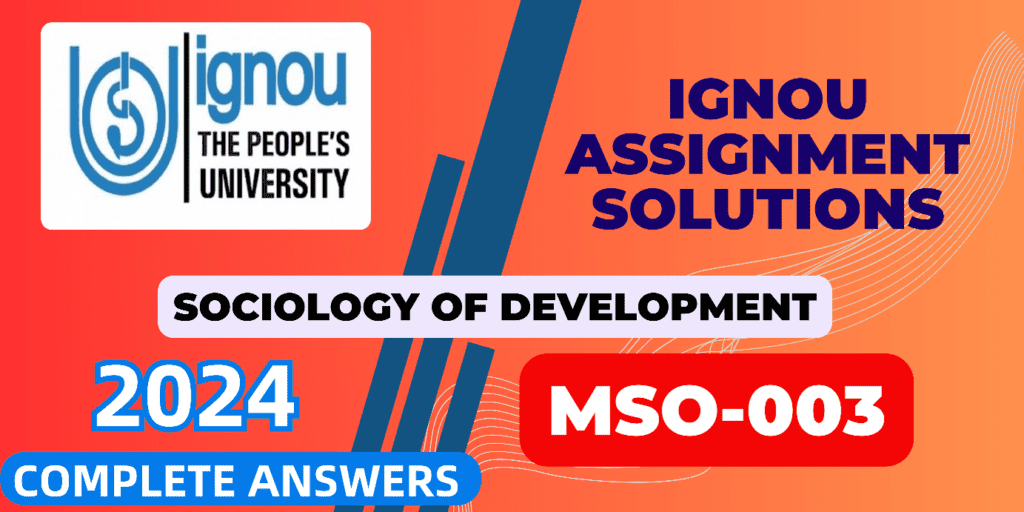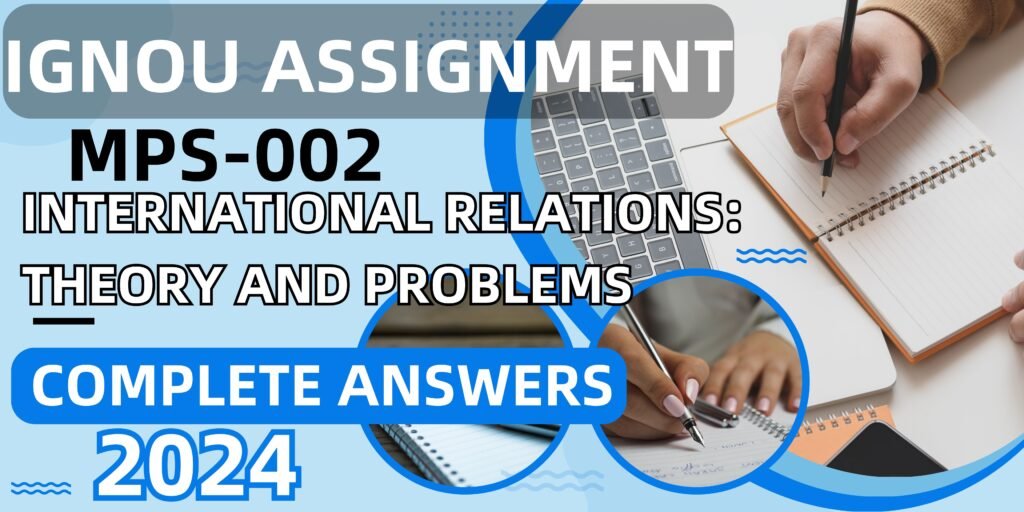IGNOU MSO 003 Assignment Solution
Indira Gandhi National Open University
Core Course in M.A. Sociology
MSO-003: Sociology of Development
Tutor Marked Assignment (TMA)
Programme Code: MSO
Course Code: MSO-003
Assignment Code: MSO-003/AST/TMA/2023-24
Answer any five questions selecting at least two from each of the sections. Your answers should be in about 500 words each.
Section -I
- What is Development? Discuss the social and human dimensions of development.
- What is Green Peace Movement? Discuss its relevance in contemporary world.
- Explain in detail the concept of ethno-development and its relevance in India’s developmental strategy.
Section-II
- Discuss in detail the emergence and growth of people science movement.
- What do you understand by ‘human development’? How does it differ from economic development.
Answers
Section -I
1. What is Development? Discuss the social and human dimensions of development.
Development is a dynamic process that encompasses economic growth, social progress, and human well-being. It is not merely about increasing a country’s GDP or building infrastructure; rather, it involves enhancing the quality of life for individuals, ensuring equitable access to resources, and fostering an environment where people can achieve their full potential. Development, in its truest sense, is multidimensional, involving economic, social, political, and human aspects that together contribute to the overall progress of society.
The Social Dimensions of Development
The social dimensions of development focus on improving the well-being of individuals and communities. Social development aims to create a society that is more inclusive, equitable, and just. It addresses issues like poverty, education, healthcare, gender equality, and social justice, which are crucial for a holistic approach to development.
1. Education and Literacy: Education is a cornerstone of social development. It empowers individuals with knowledge, skills, and the ability to contribute meaningfully to society. Increased access to education, particularly for marginalized communities, can break the cycle of poverty and enable people to improve their economic status. Furthermore, literacy rates are often used as indicators of development, reflecting a society’s commitment to improving the intellectual and cultural capacities of its citizens.
2. Healthcare and Well-being: A robust healthcare system is vital for the development of a nation. Health is intrinsically linked to development because a healthy population is more productive and capable of contributing to economic growth. Social development strategies often focus on reducing health disparities, improving access to healthcare services, and promoting healthy lifestyles. This includes addressing issues such as child mortality, maternal health, infectious diseases, and access to clean water and sanitation.
3. Social Equity and Justice: Development should aim to reduce inequalities in society. This involves ensuring that all individuals have equal opportunities to succeed, regardless of their socio-economic background, gender, race, or ethnicity. Social equity is crucial for sustainable development because it fosters social cohesion and stability. Social justice, on the other hand, involves the fair distribution of resources and opportunities, ensuring that marginalized groups are not left behind.
4. Gender Equality: Gender equality is an essential component of social development. Empowering women and ensuring their participation in all spheres of life—economic, political, and social—leads to more sustainable and inclusive development. Gender equality not only benefits women but also strengthens communities and economies by tapping into the full potential of half the population.
5. Community Development and Participation: Social development also emphasizes the importance of community engagement and participation. Development initiatives are more effective when they involve the communities they aim to serve. Community participation ensures that development projects are culturally relevant, address the actual needs of the population, and are sustainable in the long term.
The Human Dimensions of Development
Human development goes beyond economic indicators to measure the real progress of societies by focusing on people’s well-being and capabilities. It is about creating an environment where people can live long, healthy lives, have access to education, and enjoy a decent standard of living. The concept of human development is deeply rooted in the ideas of freedom, dignity, and human rights.
1. Human Capabilities and Potential: Human development is fundamentally about expanding people’s capabilities and choices. This means creating conditions where individuals can develop their potential, be it through education, skill development, or access to resources. It also involves removing barriers that prevent people from realizing their potential, such as poverty, discrimination, and lack of access to healthcare.
2. Human Rights and Dignity: Human development is closely linked to human rights. It is about ensuring that every person has the right to live with dignity, free from fear and want. This includes civil and political rights, such as the right to freedom of expression and association, as well as social and economic rights, such as the right to education, healthcare, and a decent standard of living.
3. Quality of Life: The quality of life is a key indicator of human development. It encompasses various aspects, including health, education, income, and personal security. Human development aims to improve the overall quality of life by ensuring that individuals have access to the resources and opportunities they need to lead fulfilling lives.
4. Environmental Sustainability: Human development also considers the impact of development on the environment. Sustainable development seeks to meet the needs of the present without compromising the ability of future generations to meet their own needs. This involves managing natural resources responsibly and ensuring that economic growth does not come at the expense of environmental degradation.
5. Freedom and Empowerment: At its core, human development is about empowering individuals to make choices and take control of their own lives. This includes freedom from oppression, exploitation, and discrimination, as well as the freedom to pursue one’s own goals and aspirations.
Conclusion
Development, in its broadest sense, is a process that encompasses both social and human dimensions. It involves not just economic growth, but also the improvement of social conditions, the enhancement of human capabilities, and the protection of human rights. A holistic approach to development recognizes that true progress is achieved when all individuals have the opportunity to live fulfilling lives, free from poverty, inequality, and oppression. The social and human dimensions of development are therefore essential for creating a more just, equitable, and sustainable world.
2. What is Green Peace Movement? Discuss its relevance in contemporary world.
The Greenpeace Movement: Origins and Evolution
The Greenpeace movement is a global environmental organization that originated in the early 1970s. It began as a small group of activists who were determined to stop nuclear testing by the United States in Alaska. The movement quickly gained international attention for its nonviolent direct actions and commitment to raising awareness about environmental issues. Over the decades, Greenpeace has grown into one of the most influential environmental organizations in the world, known for its campaigns against environmental degradation, pollution, and climate change.
Core Principles and Objectives
Greenpeace operates on the principles of non-violence, independence, and bearing witness. The organization refuses to accept funding from governments, corporations, or political parties, ensuring its independence and objectivity. Greenpeace’s primary objectives include:
- Promoting Ecological Sustainability: Greenpeace advocates for the conservation and sustainable management of the Earth’s resources, recognizing that human well-being is intrinsically linked to the health of the environment.
- Combating Climate Change: The movement plays a pivotal role in raising awareness about climate change and lobbying for global policies that reduce greenhouse gas emissions. Greenpeace campaigns for the transition from fossil fuels to renewable energy sources.
- Protecting Biodiversity: Greenpeace works to preserve the planet’s biodiversity by opposing deforestation, overfishing, and the destruction of habitats. It campaigns to protect endangered species and promote sustainable practices in agriculture and fishing.
- Preventing Pollution: The organization actively campaigns against pollution, advocating for policies that reduce plastic waste, toxic chemicals, and other pollutants that harm the environment and human health.
- Advocating for Peace: True to its origins, Greenpeace continues to campaign against the proliferation of nuclear weapons and other weapons of mass destruction, linking environmental health to global peace.
Key Achievements and Campaigns
Greenpeace has been at the forefront of numerous environmental campaigns that have led to significant changes in policy and public awareness. Some of its key achievements include:
- Stopping Nuclear Testing: One of Greenpeace’s earliest successes was its role in halting nuclear testing in the Pacific Ocean, which set the stage for international treaties banning nuclear tests.
- Whaling and Overfishing: Greenpeace’s campaigns against commercial whaling and overfishing have raised global awareness and led to the creation of international agreements to protect marine life.
- Climate Change Action: Greenpeace has been instrumental in pushing for global climate agreements, such as the Kyoto Protocol and the Paris Agreement. Its activism has contributed to the growing global consensus on the need for urgent climate action.
- Forest Conservation: Greenpeace’s campaigns against deforestation in the Amazon, Southeast Asia, and other critical regions have led to stronger protections for forests and the indigenous communities that depend on them.
- Plastic Pollution: Greenpeace has been a leading voice in the fight against plastic pollution, pressuring corporations to reduce plastic waste and advocating for policies that promote recycling and the reduction of single-use plastics.
Relevance in the Contemporary World
In the contemporary world, the relevance of the Greenpeace movement is more pronounced than ever. The environmental challenges facing the planet have become more complex and urgent, making the work of Greenpeace critical in several key areas: (Continue….)
Click Here for Complete Answer
Download Complete Answer PDF
-
MA Sociology IGNOU MSO-001 Assignment Solution
Original price was: ₹399.00.₹29.00Current price is: ₹29.00. Add to cart -
MA Sociology IGNOU MSO-002 Assignment Solution
Original price was: ₹599.00.₹59.00Current price is: ₹59.00. Add to cart -
MA Sociology IGNOU MSO-003 Assignment Solution
Original price was: ₹399.00.₹29.00Current price is: ₹29.00. Add to cart -
MA Sociology IGNOU MSO-004 Assignment Solution
Original price was: ₹399.00.₹29.00Current price is: ₹29.00. Add to cart
Click Here for Download Assignment Questions
ignou mso 003 assignment solution ignou mso 003 assignment solution ignou mso 003 assignment solution ignou mso 003 assignment solution ignou mso 003 assignment solution ignou mso 003 assignment solution ignou mso 003 assignment solution ignou mso 003 assignment solution ignou mso 003 assignment solution ignou mso 003 assignment solution ignou mso 003 assignment solution ignou mso 003 assignment solution ignou mso 003 assignment solution ignou mso 003 assignment solution
ignou mso 003 assignment solution ignou mso 003 assignment solution ignou mso 003 assignment solution ignou mso 003 assignment solution ignou mso 003 assignment solution ignou mso 003 assignment solution ignou mso 003 assignment solution ignou mso 003 assignment solution ignou mso 003 assignment solution ignou mso 003 assignment solution ignou mso 003 assignment solution ignou mso 003 assignment solution ignou mso 003 assignment solution ignou mso 003 assignment solution ignou mso 003 assignment solution







